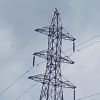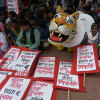Spl power plant to check outage
The Power Development Board (PDB) is floating a tender to set up a gas-fired power plant in Shahjibazaar that would remain standby to pump in electricity whenever there is a supply drop in the national grid.
It would be the first of four 100-megawatt "Sewing" power plants to be used to prevent sudden nation-wide power failure due to accidental drop in regular power supply, according to a well-placed PDB official.
The tender will be made open for local and international bidders on Wednesday.
But the interested companies allege the bidding criteria are restrictive and will allow bidders manufacturing only a particular type of gas turbine to participate.
They are urging the PDB to make the criteria flexible to increase the participation of bidders.
The PDB-set criteria dictate that bidders must have a single unit 100MW gas turbine.
Such turbines are manufactured only by one power technology company in the world --General Electric (GE) of the USA. And turbine manufacturers typically side with one or two bidders in a tender process to avoid conflict of interest.
This prompted Siemens of Germany, another giant turbine manufacturer, to write to the PDB late last month expressing its concerns.
"It seems from the [tender] document that the tender is prepared for 100MW+ single unit which is restricting the competition," and there was only one manufacturer that can deliver the product, it wrote.
Since the Public Procurement Rules encouraged competition, the authorities should allow bidders that can generate the same amount of electricity using multiple gas turbines, Siemens added.
Local power company Energypac echoed the concerns in a letter to the PDB in December.
"We believe this will absolutely limit the competition" and the PDB will end up with "an expensive and monopolistic solution. Absence of potential competitive bids from the local bidders will deprive the country of its capacity building," it said in the letter.
Energypac too urged the PDB to widen the scope for participation by relaxing the criterion on the capacity of a single turbine unit.
A highly placed PDB official admitted that the bidding criteria indeed allowed only the GE to participate.
"But we still have some time to change this criterion," he told this correspondent.
The country experienced its last nationwide grid failure in November 2014 due to a technical glitch in the Bangladesh-India Power Interconnection Line in Bheramara, which is used for importing 450MW electricity. The situation took several days to normalise.
Following the disaster, the government formed a committee to suggest ways to prevent such incidents in future.
A nationwide grid failure happens when an unwanted disruption takes place in the national grid in one location. The sudden drop of power supply instantly affects the power plants connected to the grid and they shut down one by one in a chain reaction.

 For all latest news, follow The Daily Star's Google News channel.
For all latest news, follow The Daily Star's Google News channel. 








Comments